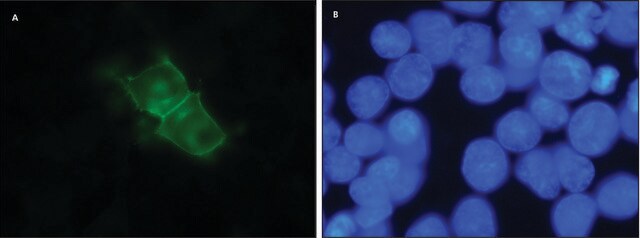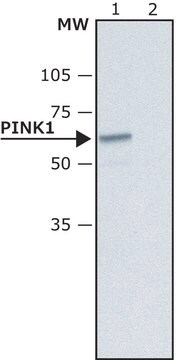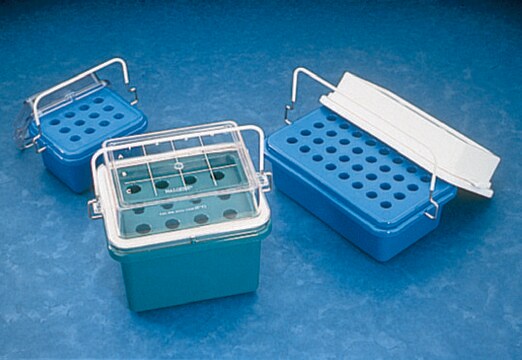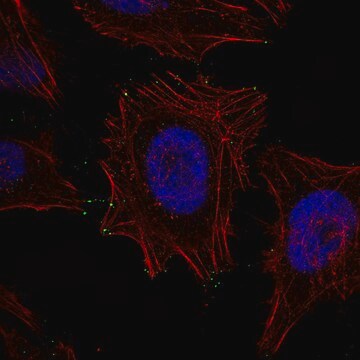一般說明
We are committed to bringing you greener alternative products, which adhere to one or more of The 12 Principles of Green Chemistry.This antibody is Preservative-free, produced without the harm or sacrifice of animals and exceptionally stable to allow for ambient shipping and storage if needed and thus aligns with "Waste Prevention", "Designing Safer Chemicals" and "Design for Energy Efficiency".
Click here for more information.
ZooMAb® antibodies represent an entirely new generation of recombinant monoclonal antibodies.Each ZooMAb® antibody is manufactured using our proprietary recombinant expression system, purified to homogeneity, and precisely dispensed to produce robust and highly reproducible lot-to-lot consistency. Only top-performing clones are released for use by researchers. Each antibody is validated for high specificity and affinity across multiple applications, including its most commonly used application. ZooMAb® antibodies are reliably available and ready to ship when you need them.
特異性
Clone 1F4 is a ZooMAb® Rabbit recombinant monoclonal antibody that specifically detects Parkinson disease protein 7 (PARK7/DJ-1). it targets an epitope within 24 amino acids from the C-terminal region.
免疫原
KLH-conjugated linear peptide corresponding to 24 amino acids from the C-terminal region of human Parkinson disease protein 7 (PARK7/DJ-1).
應用
Quality Control Testing
Evaluated by Western Blotting in Jurkat cell lysate.
Western Blotting Analysis: A 1:10,000 dilution of this antibody detected PARK7/DJ-1 in Jurkat cell lysate.
Tested applications
Western Blotting Analysis: A 1:1,000 dilution from a representative lot detected PARK7/DJ-1 in lysates from Rat brain tissue and HeLa cells.
Immunohistochemistry (Paraffin) Analysis: A 1:1,000 dilution from a representative lot detected PARK7/DJ-1 in human pancreas tissue sections.
Affinity Binding Assay: A representative lot of this antibody bound PARK7/DJ-1 peptide with a KD of 4.6 x 10-7 in an affinity binding assay.
Immunocytochemistry Analysis: A 1:100 dilution from a representative lot detected PARK7/DJ-1 in C6, HeLa, and Raji cells.
Note: Actual optimal working dilutions must be determined by end user as specimens, and experimental conditions may vary with the end user
Evaluated by Western Blotting in Jurkat cell lysate.
Western Blotting Analysis: A 1:10,000 dilution of this antibody detected PARK7/DJ-1 in Jurkat cell lysate.
標靶描述
Parkinson disease protein 7 (UniProt: Q99497; also known as Maillard deglycase, Oncogene DJ1, Parkinsonism-associated deglycase, Protein DJ-1, DJ-1;Protein/nucleic acid deglycase DJ-1) is encoded by the PARK7 gene (Gene ID: 11315) in human. PARK7 is a multifunctional protein that plays an important role in protection against oxidative stress and acts as an oxidative stress sensor and redox-sensitive chaperone. Under normal conditions, it is localized predominantly in the cytoplasm and, to a lesser extent, in the nucleus and mitochondrion. It translocates to the mitochondrion and subsequently to the nucleus in response to oxidative stress and exerts an increased cytoprotective effect against oxidative damage. It plays a role in regulating expression or stability of the mitochondrial uncoupling proteins SLC25A14 and SLC25A27 in dopaminergic neurons of the substantia nigra pars compacta and attenuates the oxidative stress induced by calcium entry into the neurons via L-type channels. It is also shown to be essential for correct mitochondrial morphology and function and for mitophagy of dysfunctional mitochondria. It has a protective role in pancreatic islets where it is involved in the maintenance of mitochondrial reactive oxygen species levels and glucose homeostasis in an age- and diet dependent manner. PARK7 also functions as a nucleotide deglycase that is able to repair glycated guanine in the free nucleotide pool and in DNA and RNA. It reverses methylglyoxal and glyoxal damage via nucleotide sanitization and direct nucleic acid repair. As a protein deglycase, it also repairs methylglyoxal- and glyoxal-glycated proteins, and releases repaired proteins and lactate or glycolate, respectively. This ZooMAbZooMAb® recombinant monoclonal antibody, generated by our propriety technology, offers significantly enhanced specificity, affinity, reproducibility, and stability over conventional monoclonals. (Ref.: Advedissian, T., et al. (2016). Biochem. Biophys. Res. Commun. 473(1); 87-91; Junn, E., et al. (2009). J. Neurosci. Res. 87(1); 123-129).
外觀
Purified recombinant rabbit monoclonal antibody IgG, lyophilized in PBS, 5% Trehalose, normal appearance a coarse or translucent resin. The PBS/trehalose components in the ZooMAb formulation can have the appearance of a semi-solid (bead like gel) after lyophilization. This is a normal phenomenon. Please follow the recommended reconstitution procedure in the data sheet to dissolve the semi-solid, bead-like, gel-appearing material. The resulting antibody solution is completely stable and functional as proven by full functional testing. Contains no biocide or preservatives, such as azide, or any animal by-products. Larger pack sizes provided as multiples of 25 μL.
重構
300 μg/mL after reconstitution at 25 μL per vial. Please refer to guidance on suggested starting dilutions and/or titers per application and sample type.
儲存和穩定性
Recommend storage of lyophilized product at 2-8°C; Before reconstitution, micro-centrifuge vials briefly to spin down material to bottom of the vial; Reconstitute each vial by adding 25 μL of filtered lab grade water or PBS; Reconstituted antibodies can be stored at 2-8°C, or -20°C for long term storage. Avoid repeated freeze-thaws.
法律資訊
ZooMAb is a registered trademark of Merck KGaA, Darmstadt, Germany
免責聲明
Unless otherwise stated in our catalog or other company documentation accompanying the product(s), our products are intended for research use only and are not to be used for any other purpose, which includes but is not limited to, unauthorized commercial uses, in vitro diagnostic uses, ex vivo or in vivo therapeutic uses or any type of consumption or application to humans or animals.





